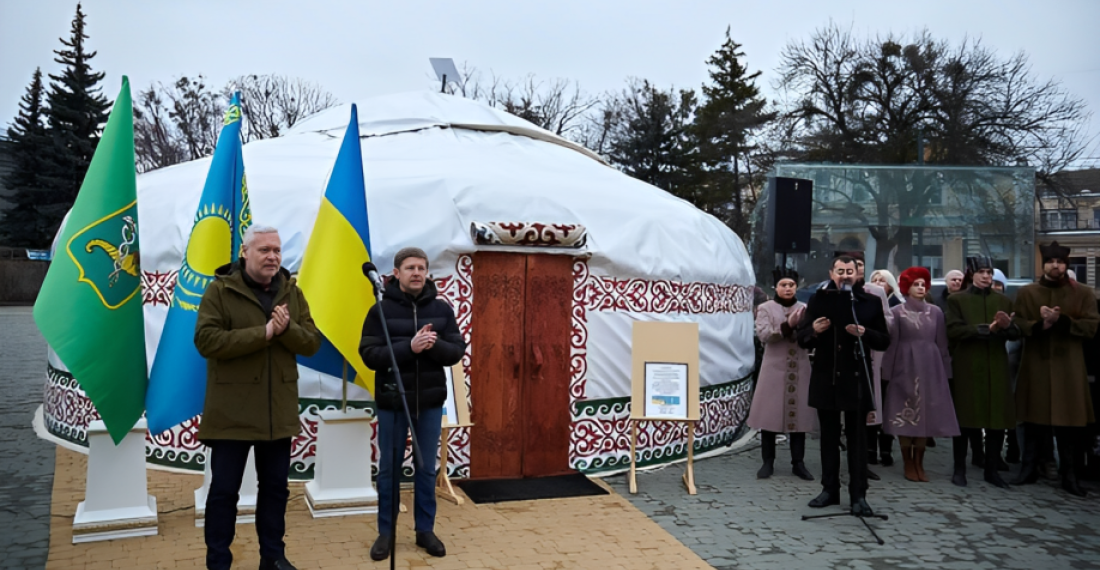In early January 2023, amid the freezing temperatures and power blackouts of Bucha - the Kyiv suburb now infamous for it being the location of Russian massacres of Ukrainian civilians in early 2022 - there popped up a Kazakh yurt where residents were served free traditional Kazakh food and tea, could keep warm and could charge their electronic devices. Soon after, another yurt appeared in downtown Kyiv. This initiative, dubbed “Yurts of Invincibility”, financed by the Kazakh entrepreneur Daulet Nurzhanov and supported by the Kazakh diaspora, is more than just a humanitarian initiative for Ukrainians, writes commonspace.eu Deputy Editor Patrick Norén. “They are a very telling symbol of change and a poignant message of defiance, strength and confidence for Kazakhs too.”
Whether it be military hardware, humanitarian aid, financial support, or private initiatives, many countries from across the world have pitched in to help Ukraine over the past year. That Kazakhstan is doing the same is in this regard nothing remarkable. The “Yurts of Invincibility” are another gesture of the newfound solidarity that much of the Eurasian space has discovered for the embattled democracy since February 2022, and one which expresses the desire and belief of many countries that Ukraine can and will prevail over Russia. For Ukraine, it is a small gesture but a powerful message that demonstrates that their Kazakh friends are thinking of them and supporting them in their hour of need.
For Kazakhstan on the other hand, the “Yurts of Invincibility” in Bucha, Kyiv, and most recently Kharkiv, are a cultural symptom of the dramatic shift in Central Asia’s geopolitical reality that has occurred over the past year. Not only a humanitarian gesture to Ukrainians, the “Yurts of Invincibility” are a very telling symbol of change and a poignant message of defiance, strength and confidence for Kazakhs too.
The yurt is perhaps the most enduring symbol of nomadic cultures, for which Central Asia and Kazakhstan in particular is famous. Having suffered during Soviet times, traditional nomadic culture is being increasingly celebrated in Kazakhstan as the country tries to create a strong cultural future entirely separate from the memory of its former imperial oppressor. Kazakhstan’s Ukrainian yurts are also a message to Kazakhs that they can find “invincibility” in the face of an existential threat by rediscovering and reimagining their country’s traditional cultures.
In the words of California-based Kazakh academic Azamat Jurisbai: “Yurts of Invincibility are poignant manifestations of post-colonial solidarity between Kazakhstan and Ukraine [...] As a Qazaq person, I am happy that the traditional nomadic dwellings of my ancestors are going up in Ukraine.” Incidentally, precisely this idea has underpinned the post-Euromaidan Ukrainian cultural revival too.
In other words, seeing their Ukrainian friends’ suffering and recognising their shared struggle against Russian and Soviet rule, Kazakhstan has taken the humble yurt and imbued it with contemporary connotations of strength, defiance, independence, and, yes, invincibility. It is a pointed message for Kazakhs just as much as it is a humanitarian initiative for Ukrainians.
After the yurt in Bucha had been opened, Ukrainian media reported that the project had been supported by the Embassy of Kazakhstan in Kyiv, and that some employees had also come to offer their help. Speaking to Radio Free Europe/Radio Liberty, volunteer Marat Darmenov said that diplomats had indeed come to help in an unofficial capacity as “concerned people”.
The Russian response to this was somewhat predictable, once more betraying Moscow’s deep insecurities over things the rest of the world would regard as trivial. The Russian Ministry of Foreign Affairs spokeswoman Maria Zakharova said in a statement on 10 January that Moscow expected an official explanation from Kazakhstan about the yurts, “in order to avoid damaging the Russia-Kazakhstan strategic partnership and alliance.”
One day later, the Kazakh Foreign Ministry spokesman Aibek Smadiyarov, responding to a question from an RFE/RL journalist, gave a response emblematic of the confidence with which Kazakhstan can operate internationally now the country is slipping out from underneath Moscow’s thumb.
“We do not see any problem in setting up a yurt. They set one up, and so what? A yurt is the traditional home of nomads, it is easy to assemble, can easily be moved to a new place and is environmentally friendly. This is probably why Kazakh businessmen chose this type of accommodation. This is a private initiative of Kazakh philanthropists who chose to help the Ukrainian people. We can neither comment on this nor forbid it. We don’t consider it necessary to give a special comment about this because we do not see any problem in setting up this yurt. On the contrary, we are proud that we have the yurt.”
The diplomatic tit-for-tat aside, this small Kazakh initiative taking a symbol of their traditional ancient culture and imbuing it with very different contemporary connotations - and ones that will rankle in Moscow too - is emblematic of the political and cultural changes that Russia’s failing invasion of Ukraine will herald for Kazakhstan and indeed Central Asia as a whole. One should be under no illusions that the Kazakh “Yurts of Invincibility” are in fact just as much a political and cultural message for Kazakhstan as they are a humanitarian initiative for Ukraine.
source: Patrick Norén is the Deputy Editor of commonspace.eu.
photo: Censor.net
The views expressed in opinion pieces and commentaries do not necessarily reflect the position of commonspace.eu or its partners.






